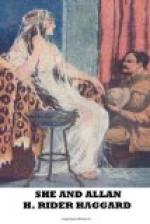A little later a fat, half-breed man—I should say from his curling hair that his mother was a negress and his father a Portuguese—appeared with some other nondescript fellows and began to give directions in a competent fashion about our oxen, also as to the killing of a calf. He spoke in bastard Portuguese, which I could understand, and I heard him talk of Umslopogaas to whom he pointed, as “that nigger,” after the fashion of such cross-bred people who choose to consider themselves white men. Also he made uncomplimentary remarks about Hans, who of course understood every word he said. Evidently Thomaso’s temper had been ruffled by this sudden and violent disturbance of his nap.
Just then our host appeared puffing with his exertions and declaring that he had stirred up the swine with a vengeance, in proof of which he pointed to the sjambok that was reddened with blood.
“Captain Robertson,” I said, “I wish to give you a hint to be passed on to Mr. Thomaso, if that is he. He spoke of the Zulu soldier there as a nigger, etc. Well, he is a chief of a high rank and rather a terrible fellow if roused. Therefore I recommend Mr. Thomaso not to let him understand that he is insulting him.”
“Oh! that’s the way of these ‘snuff-and-butters’ one of whose grandmothers once met a white man,” replied the Captain, laughing, “but I’ll tell him,” and he did in Portuguese.
His retainer listened in silence, looking at Umslopogaas rather sulkily. Then we walked into the house. As we went the Captain said,
“Senor Thomaso—he calls himself Senor—is my manager here and a clever man, honest too in his way and attached to me, perhaps because I saved his life once. But he has a nasty temper, as have all these cross-breeds, so I hope he won’t get wrong with that native who carries a big axe.”
“I hope so too, for his own sake,” I replied emphatically.
The Captain led the way into the sitting-room; there was but one in the house. It proved a queer kind of place with rude furniture seated with strips of hide after the Boer fashion, and yet bearing a certain air of refinement which was doubtless due to Inez, who, with the assistance of a stout native girl, was already engaged in setting the table. Thus there was a shelf with books, Shakespeare was one of these, I noticed—over which hung an ivory crucifix, which suggested that Inez was a Catholic. On the walls, too, were some good portraits, and on the window-ledge a jar full of flowers. Also the forks and spoons were of silver, as were the mugs, and engraved with a tremendous coat-of-arms and a Portuguese motto.
Presently the food appeared, which was excellent and plentiful, and the Captain, his daughter and I sat down and ate. I noted that he drank gin and water, an innocent-looking beverage but strong as he took it. It was offered to me, but like Miss Inez, I preferred coffee.




